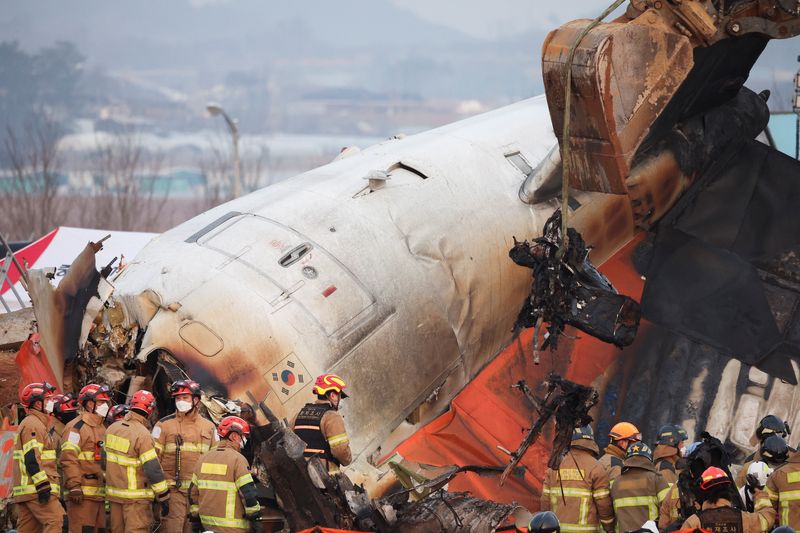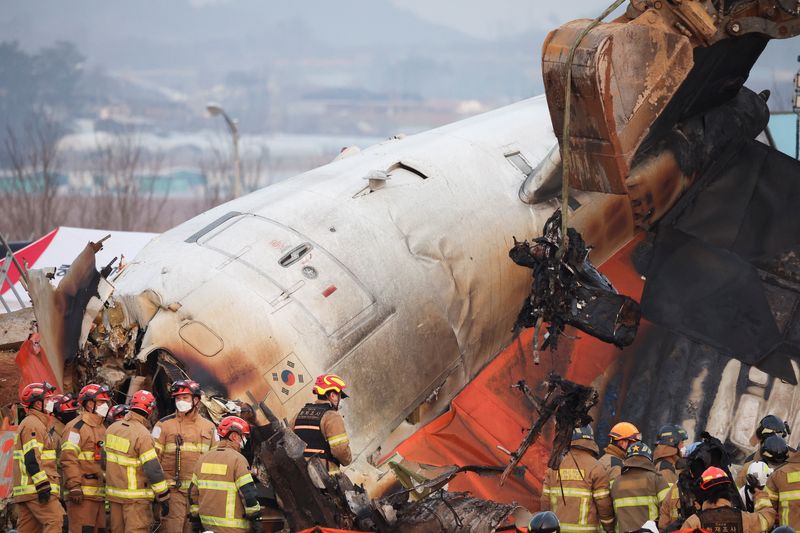Stock Markets
Fiery plane crash kills 179 in worst airline disaster in South Korea

By Ju-min Park, Hongji Kim and Hyunsu Yim
MUAN COUNTY, South Korea (Reuters) -The deadliest air accident ever in South Korea killed 179 people on Sunday, when an airliner belly-landed and skidded off the end of the runway, erupting in a fireball as it slammed into a wall at Muan International Airport.
Jeju Air flight 7C2216, arriving from the Thai capital Bangkok with 175 passengers and six crew on board, was trying to land shortly after 9 a.m. (0000 GMT) at the airport in the south of the country, South Korea’s transport ministry said.
Two crew members survived and were being treated for injuries.
The deadliest air accident on South Korean soil was also the worst involving a South Korean airline in nearly three decades, the transport ministry said.
The twin-engine Boeing (NYSE:) 737-800 was seen in local media video skidding down the runway with no visible landing gear before crashing into navigation equipment and a wall in an explosion of flames and debris.
“Only the tail part retains a little bit of shape, and the rest of (the plane) looks almost impossible to recognise,” Muan fire chief Lee Jung-hyun told a press briefing.
The two crew members, a man and a woman, were rescued from the tail section of the burning plane, Lee said. They were being treated at hospitals with medium to severe injuries, said the head of the local public health centre.
Authorities combed nearby areas for bodies possibly thrown from the plane, Lee said.
Investigators are examining bird strikes and weather conditions as possible factors, Lee said. Yonhap news agency cited airport authorities as saying a bird strike may have caused the landing gear to malfunction.
The crash was the worst for any South Korean airline since a 1997 Korean Air crash in Guam that killed more than 200 people, transportation ministry data showed. The previous worst on South Korean soil was an Air China (OTC:) crash that killed 129 in 2002.
Experts said the bird strike report and the way the aircraft attempted to land raised more questions than answers.
“A bird strike is not unusual, problems with an undercarriage are not unusual,” said Airline News editor Geoffrey Thomas. “Bird strikes happen far more often, but typically they don’t cause the loss of an airplane by themselves.”
Under global aviation rules, South Korea will lead a civil investigation into the crash and automatically involve the National Transportation Safety Board (NTSB) in the United States where the plane was designed and built.
The NTSB said later it was leading a team of U.S. investigators to help South Korea’s aviation authority. Boeing and the Federal Aviation Administration were also taking part.
‘MY LAST WORDS’
Hours after the crash, family members gathered in the airport’s arrival area, some crying and hugging as Red Cross volunteers handed out blankets.
Many victims appeared to be residents of nearby areas returning from vacation, officials said.
Families screamed and wept as a medic announced the names of victims identified by their fingerprints. Papers were circulated for families to write down their contact details.
One relative stood at a microphone to ask for more information from authorities. “My older brother died and I don’t know what’s going on,” he said. “I don’t know.”
Another asked journalists not to film. “We are not monkeys in a zoo,” he said. “We are the bereaved families.”
Mortuary vehicles lined up outside to take bodies away, and authorities said a temporary morgue had been established.
The crash site smelled of aviation fuel and blood, according to Reuters witnesses. Workers in protective suits and masks combed the area while soldiers searched through bushes.
The control tower issued a bird strike warning and shortly afterward the pilots declared mayday and then attempted to land from the opposite direction, a transport ministry official said.
A passenger texted a relative to say a bird was stuck in the wing, the News1 agency reported. The person’s final message was, “Should I say my last words?”
The aircraft was manufactured in 2009, the transport ministry said.
The Boeing model involved in the crash, a 737-800, is one of the world’s most flown airliners with a generally strong safety record. It was developed well before the MAX variant involved in a recent Boeing safety crisis.
Boeing said in a emailed statement, “We are in contact with Jeju Air regarding flight 2216 and stand ready to support them. We extend our deepest condolences to the families who lost loved ones, and our thoughts remain with the passengers and crew.”
The two CFM56-7B26 engines were manufactured by CFM International, a joint venture between GE Aerospace and France’s Safran (EPA:), the transport ministry said.
A CFM spokesperson said, “We are deeply saddened by the loss of Jeju Air flight 2216. We extend our heartfelt sympathies to the families and loved ones of those on board.”
CHALLENGE TO COUNTRY’S NEW INTERIM PRESIDENT
Jeju Air CEO Kim E-bae apologised for the accident, bowing deeply during a televised briefing.
He said the aircraft had no record of accidents and there were no early signs of malfunction. The airline will cooperate with investigators and make supporting the bereaved its top priority, Kim said.
No abnormal conditions were reported when the aircraft left Bangkok’s Suvarnabhumi Airport, said Kerati Kijmanawat, president of Airports of Thailand.
The passengers included two Thai nationals and the rest are believed to be South Koreans, according to the transportation ministry.
It was the first fatal flight for Jeju Air, a low-cost airline founded in 2005 that ranks behind only Korean Air Lines and Asiana Airlines in terms of the number of passengers in South Korea.
The accident happened only three weeks after Jeju Air started regular flights from Muan to Bangkok and other Asian cities on Dec. 8.
Muan International is one of South Korea’s smallest airports but it has become much busier in recent years. All domestic and international flights at the airport were cancelled after the accident, Yonhap reported.
South Korean acting President Choi Sang-mok, named interim leader of the country on Friday in an ongoing political crisis, arrived at the scene of the accident and said the government was putting all its resources into dealing with the crash.
Two Thai women were on the plane, aged 22 and 45, Thai government spokesperson Jirayu Houngsub said.

The Thai foreign ministry later confirmed both were among those killed. The embassy in Seoul was coordinating with the South Koreans and arranging for family members to travel from Thailand, the ministry said in a statement.
Thai Prime Minister Paetongtarn Shinawatra sent condolences to the families of the dead and injured in a post on X, saying she had instructed the foreign ministry to provide assistance.
Stock Markets
Suburban Propane director Logan sells $139k in shares
Stock Markets
Stock market today: S&P 500 closes lower, but posts big weekly win
Stock Markets
TD Bank promotes Laura Nitti to retail market president role

 Forex3 years ago
Forex3 years agoForex Today: the dollar is gaining strength amid gloomy sentiment at the start of the Fed’s week

 Forex3 years ago
Forex3 years agoUnbiased review of Pocket Option broker

 Forex3 years ago
Forex3 years agoDollar to pound sterling exchange rate today: Pound plummeted to its lowest since 1985

 Forex3 years ago
Forex3 years agoHow is the Australian dollar doing today?

 Cryptocurrency3 years ago
Cryptocurrency3 years agoWhat happened in the crypto market – current events today

 World3 years ago
World3 years agoWhy are modern video games an art form?

 Commodities3 years ago
Commodities3 years agoCopper continues to fall in price on expectations of lower demand in China

 Economy3 years ago
Economy3 years agoCrude oil tankers double in price due to EU anti-Russian sanctions





















